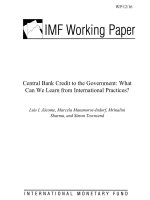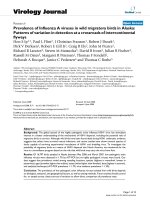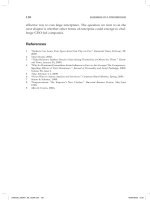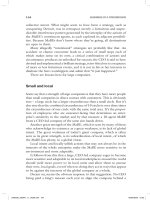Central banks at a crossroads what can we learn from history
Bạn đang xem bản rút gọn của tài liệu. Xem và tải ngay bản đầy đủ của tài liệu tại đây (16.59 MB, 716 trang )
CENTRAL BANKS AT A CROSSROADS
Throughout their long history, the primary concern of central banks has
oscillated between price stability in normal times and financial stability in
extraordinary times. In the wake of the recent global financial crisis, central
banks have been given additional responsibilities to ensure financial stability,
which has sparked intense debate over the nature of their role. Bankers and
policy makers face an enormous challenge finding the right balance of power
between the central bank and the state.
This volume is the result of an international conference held at Norges Bank
(the central bank of Norway). International experts and policy makers present
research and historical analysis on the evolution of the central bank. They
specifically focus on four key aspects: its role as an institution, the part it plays
within the international monetary system, how to delineate and limit its
functions, and how to apply the lessons of the past two centuries.
Michael D. Bordo is Professor of Economics and Director of the Center for
Monetary and Financial History at Rutgers University–New Brunswick.
Øyvind Eitrheim is a director at the General Secretariat, Norges Bank.
Marc Flandreau is Professor of International History at the Graduate Institute
of International Studies and Development in Geneva.
Jan F. Qvigstad is Executive Director at the General Secretariat, Norges Bank.
Downloaded from https:/www.cambridge.org/core. University of Florida, on 21 May 2017 at 14:13:33, subject to the Cambridge Core terms
of use, available at https:/www.cambridge.org/core/terms. />
Downloaded from https:/www.cambridge.org/core. University of Florida, on 21 May 2017 at 14:13:33, subject to the Cambridge Core terms
of use, available at https:/www.cambridge.org/core/terms. />
STUDIES IN MACROECONOMIC HISTORY
Series Editor: Michael D. Bordo, Rutgers University
Editors: Marc Flandreau, Graduate Institute of International and Development
Studies, Geneva
Chris Meissner, University of California, Davis
François R. Velde, Federal Reserve Bank of Chicago
David C. Wheelock, Federal Reserve Bank of St. Louis
The titles in this series investigate themes of interest to economists and
economic historians in the rapidly developing field of macroeconomic history.
The four areas covered include the application of monetary and finance
theory, international economics, and quantitative methods to historical problems; the historical application of growth and development theory and theories of business fluctuations; the history of domestic and international
monetary, financial, and other macroeconomic institutions; and the history
of international monetary and financial systems. The series amalgamates the
former Cambridge University Press series Studies in Monetary and Financial
History and Studies in Quantitative Economic History.
Other books in the series:
Michael D. Bordo and Mark A. Wynne, Editors, The Federal Reserve’s Role in
the Global Economy, 2016
Owen Humpage, Current Federal Reserve Policy under the Lens of Economic
History, 2015
Michael D. Bordo and William Roberds, Editors, The Origins, History, and
Future of the Federal Reserve, 2013
Michael D. Bordo and Ronald MacDonald, Editors, Credibility and the
International Monetary Regime, 2012
Robert L. Hetzel, The Great Recession, 2012
Tobias Straumann, Fixed Ideas of Money, Small States and Exchange Rate
Regimes in Twentieth-Century Europe, 2010
Forrest Capie, The Bank of England: 1950s to 1979, 2010
Aldo Musacchio, Experiments in Financial Democracy: Corporate Governance
and Financial Development in Brazil, 1882–1950, 2009
Downloaded from https:/www.cambridge.org/core. University of Florida, on 21 May 2017 at 14:13:33, subject to the Cambridge Core terms
of use, available at https:/www.cambridge.org/core/terms. />
Claudio Borio, Gianni Toniolo, and Piet Clement, Editors, The Past and
Future of Central Bank Cooperation, 2008
Robert L. Hetzel, The Monetary Policy of the Federal Reserve: A History, 2008
Caroline Fohlin, Finance Capitalism and Germany’s Rise to Industrial Power,
2007
John H. Wood, A History of Central Banking in Great Britain and the United
States, 2005
Gianni Toniolo (with the assistance of Piet Clement), Central Bank
Cooperation at the Bank for International Settlements, 1930–1973, 2005
Richard Burdekin and Pierre Siklos, Editors, Deflation: Current and Historical
Perspectives, 2004
Pierre Siklos, The Changing Face of Central Banking: Evolutionary Trends since
World War II, 2002
Michael D. Bordo and Roberto Cortés-Conde, Editors, Transferring Wealth
and Power from the Old to the New World, 2001
Howard Bodenhorn, A History of Banking in Antebellum America, 2000
Mark Harrison (ed.), The Economics of World War II, 2000
Angela Redish, Bimetallism, 2000
Elmus Wicker, Banking Panics of the Gilded Age, 2000
Michael D. Bordo, The Gold Standard and Related Regimes, 1999
Michele Fratianni and Franco Spinelli, A Monetary History of Italy, 1997
Mark Toma, Competition and Monopoly in the Federal Reserve System,
1914–1951, 1997
Barry Eichengreen, Editor, Europe’s Postwar Recovery, 1996
Lawrence H. Officer, Between the Dollar-Sterling Gold Points, 1996
Elmus Wicker, Banking Panics of the Great Depression, 1996
Norio Tamaki, Japanese Banking, 1995
Barry Eichengreen, Elusive Stability, 1993
Michael D. Bordo and Forrest Capie, Editors, Monetary Regimes in Transition,
1993
Larry Neal, The Rise of Financial Capitalism, 1993
S. N. Broadberry and N. F. R. Crafts, Editors, Britain in the International
Economy, 1870–1939 1992
Continued after Index
Downloaded from https:/www.cambridge.org/core. University of Florida, on 21 May 2017 at 14:13:33, subject to the Cambridge Core terms
of use, available at https:/www.cambridge.org/core/terms. />
Central Banks at a Crossroads
What Can We Learn from History?
Edited by
MICHAEL D. BORDO
Rutgers University, New Jersey
ØYVIND EITRHEIM
Norges Bank, Oslo
MARC FLANDREAU
Graduate Institute of International and Development
Studies, Geneva
JAN F. QVIGSTAD
Norges Bank, Oslo
Downloaded from https:/www.cambridge.org/core. University of Florida, on 21 May 2017 at 14:13:33, subject to the Cambridge Core terms
of use, available at https:/www.cambridge.org/core/terms. />
32 Avenue of the Americas, New York NY 10013
Cambridge University Press is part of the University of Cambridge.
It furthers the University’s mission by disseminating knowledge in the pursuit of
education, learning, and research at the highest international levels of excellence.
www.cambridge.org
Information on this title: www.cambridge.org/9781107149663
© Norges Bank 2016
This publication is in copyright. Subject to statutory exception
and to the provisions of relevant collective licensing agreements,
no reproduction of any part may take place without the written
permission of Cambridge University Press.
First published 2016
Printed in the United Kingdom by TJ International Ltd. Padstow Cornwall
A catalogue record for this publication is available from the British Library.
Library of Congress Cataloguing in Publication Data
Names: Bordo, Michael D., editor.
Title: Central banks at a crossroads : what can we learn from history? / edited by Michael D. Bordo,
Rutgers University, New Jersey, Øyvind Eitrheim, Norges Bank, Marc Flandreau, Graduate
Institute of International and Development Studies, Geneva, Jan F. Qvigstad, Norges Bank.
Description: New York NY : Cambridge University Press, 2016. | Series: Studies in macroeconomic
history | Includes bibliographical references and index.
Identifiers: LCCN 2016015468 | ISBN 9781107149663 (Hardback : alk. paper)
Subjects: LCSH: Banks and banking, Central–History. | Monetary policy–History.
Classification: LCC HG1811 .C45974 2016 | DDC 332.1/1–dc23 LC record available at
/>ISBN 978-1-107-14966-3 Hardback
Cambridge University Press has no responsibility for the persistence or accuracy
of URLs for external or third-party Internet Web sites referred to in this publication
and does not guarantee that any content on such Web sites is, or will remain,
accurate or appropriate.
Downloaded from https:/www.cambridge.org/core. University of Florida, on 21 May 2017 at 14:13:33, subject to the Cambridge Core terms
of use, available at https:/www.cambridge.org/core/terms. />
CENTRAL BANKS AT A CROSSROADS
Throughout their long history, the primary concern of central banks has
oscillated between price stability in normal times and financial stability in
extraordinary times. In the wake of the recent global financial crisis, central
banks have been given additional responsibilities to ensure financial stability,
which has sparked intense debate over the nature of their role. Bankers and
policy makers face an enormous challenge finding the right balance of power
between the central bank and the state.
This volume is the result of an international conference held at Norges Bank
(the central bank of Norway). International experts and policy makers present
research and historical analysis on the evolution of the central bank. They
specifically focus on four key aspects: its role as an institution, the part it plays
within the international monetary system, how to delineate and limit its
functions, and how to apply the lessons of the past two centuries.
Michael D. Bordo is Professor of Economics and Director of the Center for
Monetary and Financial History at Rutgers University–New Brunswick.
Øyvind Eitrheim is a director at the General Secretariat, Norges Bank.
Marc Flandreau is Professor of International History at the Graduate Institute
of International Studies and Development in Geneva.
Jan F. Qvigstad is Executive Director at the General Secretariat, Norges Bank.
Downloaded from https:/www.cambridge.org/core. University of Florida, on 21 May 2017 at 14:13:54, subject to the Cambridge Core terms
of use, available at https:/www.cambridge.org/core/terms. />
Downloaded from https:/www.cambridge.org/core. University of Florida, on 21 May 2017 at 14:13:54, subject to the Cambridge Core terms
of use, available at https:/www.cambridge.org/core/terms. />
STUDIES IN MACROECONOMIC HISTORY
Series Editor: Michael D. Bordo, Rutgers University
Editors: Marc Flandreau, Graduate Institute of International and Development
Studies, Geneva
Chris Meissner, University of California, Davis
François R. Velde, Federal Reserve Bank of Chicago
David C. Wheelock, Federal Reserve Bank of St. Louis
The titles in this series investigate themes of interest to economists and
economic historians in the rapidly developing field of macroeconomic history.
The four areas covered include the application of monetary and finance
theory, international economics, and quantitative methods to historical problems; the historical application of growth and development theory and theories of business fluctuations; the history of domestic and international
monetary, financial, and other macroeconomic institutions; and the history
of international monetary and financial systems. The series amalgamates the
former Cambridge University Press series Studies in Monetary and Financial
History and Studies in Quantitative Economic History.
Other books in the series:
Michael D. Bordo and Mark A. Wynne, Editors, The Federal Reserve’s Role in
the Global Economy, 2016
Owen Humpage, Current Federal Reserve Policy under the Lens of Economic
History, 2015
Michael D. Bordo and William Roberds, Editors, The Origins, History, and
Future of the Federal Reserve, 2013
Michael D. Bordo and Ronald MacDonald, Editors, Credibility and the
International Monetary Regime, 2012
Robert L. Hetzel, The Great Recession, 2012
Tobias Straumann, Fixed Ideas of Money, Small States and Exchange Rate
Regimes in Twentieth-Century Europe, 2010
Forrest Capie, The Bank of England: 1950s to 1979, 2010
Aldo Musacchio, Experiments in Financial Democracy: Corporate Governance
and Financial Development in Brazil, 1882–1950, 2009
Downloaded from https:/www.cambridge.org/core. University of Florida, on 21 May 2017 at 14:13:54, subject to the Cambridge Core terms
of use, available at https:/www.cambridge.org/core/terms. />
Claudio Borio, Gianni Toniolo, and Piet Clement, Editors, The Past and
Future of Central Bank Cooperation, 2008
Robert L. Hetzel, The Monetary Policy of the Federal Reserve: A History, 2008
Caroline Fohlin, Finance Capitalism and Germany’s Rise to Industrial Power,
2007
John H. Wood, A History of Central Banking in Great Britain and the United
States, 2005
Gianni Toniolo (with the assistance of Piet Clement), Central Bank
Cooperation at the Bank for International Settlements, 1930–1973, 2005
Richard Burdekin and Pierre Siklos, Editors, Deflation: Current and Historical
Perspectives, 2004
Pierre Siklos, The Changing Face of Central Banking: Evolutionary Trends since
World War II, 2002
Michael D. Bordo and Roberto Cortés-Conde, Editors, Transferring Wealth
and Power from the Old to the New World, 2001
Howard Bodenhorn, A History of Banking in Antebellum America, 2000
Mark Harrison (ed.), The Economics of World War II, 2000
Angela Redish, Bimetallism, 2000
Elmus Wicker, Banking Panics of the Gilded Age, 2000
Michael D. Bordo, The Gold Standard and Related Regimes, 1999
Michele Fratianni and Franco Spinelli, A Monetary History of Italy, 1997
Mark Toma, Competition and Monopoly in the Federal Reserve System,
1914–1951, 1997
Barry Eichengreen, Editor, Europe’s Postwar Recovery, 1996
Lawrence H. Officer, Between the Dollar-Sterling Gold Points, 1996
Elmus Wicker, Banking Panics of the Great Depression, 1996
Norio Tamaki, Japanese Banking, 1995
Barry Eichengreen, Elusive Stability, 1993
Michael D. Bordo and Forrest Capie, Editors, Monetary Regimes in Transition,
1993
Larry Neal, The Rise of Financial Capitalism, 1993
S. N. Broadberry and N. F. R. Crafts, Editors, Britain in the International
Economy, 1870–1939 1992
Continued after Index
Downloaded from https:/www.cambridge.org/core. University of Florida, on 21 May 2017 at 14:13:54, subject to the Cambridge Core terms
of use, available at https:/www.cambridge.org/core/terms. />
Central Banks at a Crossroads
What Can We Learn from History?
Edited by
MICHAEL D. BORDO
Rutgers University, New Jersey
ØYVIND EITRHEIM
Norges Bank, Oslo
MARC FLANDREAU
Graduate Institute of International and Development
Studies, Geneva
JAN F. QVIGSTAD
Norges Bank, Oslo
Downloaded from https:/www.cambridge.org/core. University of Florida, on 21 May 2017 at 14:13:54, subject to the Cambridge Core terms
of use, available at https:/www.cambridge.org/core/terms. />
32 Avenue of the Americas, New York NY 10013
Cambridge University Press is part of the University of Cambridge.
It furthers the University’s mission by disseminating knowledge in the pursuit of
education, learning, and research at the highest international levels of excellence.
www.cambridge.org
Information on this title: www.cambridge.org/9781107149663
© Norges Bank 2016
This publication is in copyright. Subject to statutory exception
and to the provisions of relevant collective licensing agreements,
no reproduction of any part may take place without the written
permission of Cambridge University Press.
First published 2016
Printed in the United Kingdom by TJ International Ltd. Padstow Cornwall
A catalogue record for this publication is available from the British Library.
Library of Congress Cataloguing in Publication Data
Names: Bordo, Michael D., editor.
Title: Central banks at a crossroads : what can we learn from history? / edited by Michael D. Bordo,
Rutgers University, New Jersey, Øyvind Eitrheim, Norges Bank, Marc Flandreau, Graduate
Institute of International and Development Studies, Geneva, Jan F. Qvigstad, Norges Bank.
Description: New York NY : Cambridge University Press, 2016. | Series: Studies in macroeconomic
history | Includes bibliographical references and index.
Identifiers: LCCN 2016015468 | ISBN 9781107149663 (Hardback : alk. paper)
Subjects: LCSH: Banks and banking, Central–History. | Monetary policy–History.
Classification: LCC HG1811 .C45974 2016 | DDC 332.1/1–dc23 LC record available at
/>ISBN 978-1-107-14966-3 Hardback
Cambridge University Press has no responsibility for the persistence or accuracy
of URLs for external or third-party Internet Web sites referred to in this publication
and does not guarantee that any content on such Web sites is, or will remain,
accurate or appropriate.
Downloaded from https:/www.cambridge.org/core. University of Florida, on 21 May 2017 at 14:13:54, subject to the Cambridge Core terms
of use, available at https:/www.cambridge.org/core/terms. />
CENTRAL BANKS AT A CROSSROADS
Throughout their long history, the primary concern of central banks has
oscillated between price stability in normal times and financial stability in
extraordinary times. In the wake of the recent global financial crisis, central
banks have been given additional responsibilities to ensure financial stability,
which has sparked intense debate over the nature of their role. Bankers and
policy makers face an enormous challenge finding the right balance of power
between the central bank and the state.
This volume is the result of an international conference held at Norges Bank
(the central bank of Norway). International experts and policy makers present
research and historical analysis on the evolution of the central bank. They
specifically focus on four key aspects: its role as an institution, the part it plays
within the international monetary system, how to delineate and limit its
functions, and how to apply the lessons of the past two centuries.
Michael D. Bordo is Professor of Economics and Director of the Center for
Monetary and Financial History at Rutgers University–New Brunswick.
Øyvind Eitrheim is a director at the General Secretariat, Norges Bank.
Marc Flandreau is Professor of International History at the Graduate Institute
of International Studies and Development in Geneva.
Jan F. Qvigstad is Executive Director at the General Secretariat, Norges Bank.
Downloaded from https:/www.cambridge.org/core. University of Florida, on 21 May 2017 at 14:13:37, subject to the Cambridge Core terms
of use, available at https:/www.cambridge.org/core/terms. />
Downloaded from https:/www.cambridge.org/core. University of Florida, on 21 May 2017 at 14:13:37, subject to the Cambridge Core terms
of use, available at https:/www.cambridge.org/core/terms. />
STUDIES IN MACROECONOMIC HISTORY
Series Editor: Michael D. Bordo, Rutgers University
Editors: Marc Flandreau, Graduate Institute of International and Development
Studies, Geneva
Chris Meissner, University of California, Davis
François R. Velde, Federal Reserve Bank of Chicago
David C. Wheelock, Federal Reserve Bank of St. Louis
The titles in this series investigate themes of interest to economists and
economic historians in the rapidly developing field of macroeconomic history.
The four areas covered include the application of monetary and finance
theory, international economics, and quantitative methods to historical problems; the historical application of growth and development theory and theories of business fluctuations; the history of domestic and international
monetary, financial, and other macroeconomic institutions; and the history
of international monetary and financial systems. The series amalgamates the
former Cambridge University Press series Studies in Monetary and Financial
History and Studies in Quantitative Economic History.
Other books in the series:
Michael D. Bordo and Mark A. Wynne, Editors, The Federal Reserve’s Role in
the Global Economy, 2016
Owen Humpage, Current Federal Reserve Policy under the Lens of Economic
History, 2015
Michael D. Bordo and William Roberds, Editors, The Origins, History, and
Future of the Federal Reserve, 2013
Michael D. Bordo and Ronald MacDonald, Editors, Credibility and the
International Monetary Regime, 2012
Robert L. Hetzel, The Great Recession, 2012
Tobias Straumann, Fixed Ideas of Money, Small States and Exchange Rate
Regimes in Twentieth-Century Europe, 2010
Forrest Capie, The Bank of England: 1950s to 1979, 2010
Aldo Musacchio, Experiments in Financial Democracy: Corporate Governance
and Financial Development in Brazil, 1882–1950, 2009
Downloaded from https:/www.cambridge.org/core. University of Florida, on 21 May 2017 at 14:13:37, subject to the Cambridge Core terms
of use, available at https:/www.cambridge.org/core/terms. />
Claudio Borio, Gianni Toniolo, and Piet Clement, Editors, The Past and
Future of Central Bank Cooperation, 2008
Robert L. Hetzel, The Monetary Policy of the Federal Reserve: A History, 2008
Caroline Fohlin, Finance Capitalism and Germany’s Rise to Industrial Power,
2007
John H. Wood, A History of Central Banking in Great Britain and the United
States, 2005
Gianni Toniolo (with the assistance of Piet Clement), Central Bank
Cooperation at the Bank for International Settlements, 1930–1973, 2005
Richard Burdekin and Pierre Siklos, Editors, Deflation: Current and Historical
Perspectives, 2004
Pierre Siklos, The Changing Face of Central Banking: Evolutionary Trends since
World War II, 2002
Michael D. Bordo and Roberto Cortés-Conde, Editors, Transferring Wealth
and Power from the Old to the New World, 2001
Howard Bodenhorn, A History of Banking in Antebellum America, 2000
Mark Harrison (ed.), The Economics of World War II, 2000
Angela Redish, Bimetallism, 2000
Elmus Wicker, Banking Panics of the Gilded Age, 2000
Michael D. Bordo, The Gold Standard and Related Regimes, 1999
Michele Fratianni and Franco Spinelli, A Monetary History of Italy, 1997
Mark Toma, Competition and Monopoly in the Federal Reserve System,
1914–1951, 1997
Barry Eichengreen, Editor, Europe’s Postwar Recovery, 1996
Lawrence H. Officer, Between the Dollar-Sterling Gold Points, 1996
Elmus Wicker, Banking Panics of the Great Depression, 1996
Norio Tamaki, Japanese Banking, 1995
Barry Eichengreen, Elusive Stability, 1993
Michael D. Bordo and Forrest Capie, Editors, Monetary Regimes in Transition,
1993
Larry Neal, The Rise of Financial Capitalism, 1993
S. N. Broadberry and N. F. R. Crafts, Editors, Britain in the International
Economy, 1870–1939 1992
Continued after Index
Downloaded from https:/www.cambridge.org/core. University of Florida, on 21 May 2017 at 14:13:37, subject to the Cambridge Core terms
of use, available at https:/www.cambridge.org/core/terms. />
Central Banks at a Crossroads
What Can We Learn from History?
Edited by
MICHAEL D. BORDO
Rutgers University, New Jersey
ØYVIND EITRHEIM
Norges Bank, Oslo
MARC FLANDREAU
Graduate Institute of International and Development
Studies, Geneva
JAN F. QVIGSTAD
Norges Bank, Oslo
Downloaded from https:/www.cambridge.org/core. University of Florida, on 21 May 2017 at 14:13:37, subject to the Cambridge Core terms
of use, available at https:/www.cambridge.org/core/terms. />
32 Avenue of the Americas, New York NY 10013
Cambridge University Press is part of the University of Cambridge.
It furthers the University’s mission by disseminating knowledge in the pursuit of
education, learning, and research at the highest international levels of excellence.
www.cambridge.org
Information on this title: www.cambridge.org/9781107149663
© Norges Bank 2016
This publication is in copyright. Subject to statutory exception
and to the provisions of relevant collective licensing agreements,
no reproduction of any part may take place without the written
permission of Cambridge University Press.
First published 2016
Printed in the United Kingdom by TJ International Ltd. Padstow Cornwall
A catalogue record for this publication is available from the British Library.
Library of Congress Cataloguing in Publication Data
Names: Bordo, Michael D., editor.
Title: Central banks at a crossroads : what can we learn from history? / edited by Michael D. Bordo,
Rutgers University, New Jersey, Øyvind Eitrheim, Norges Bank, Marc Flandreau, Graduate
Institute of International and Development Studies, Geneva, Jan F. Qvigstad, Norges Bank.
Description: New York NY : Cambridge University Press, 2016. | Series: Studies in macroeconomic
history | Includes bibliographical references and index.
Identifiers: LCCN 2016015468 | ISBN 9781107149663 (Hardback : alk. paper)
Subjects: LCSH: Banks and banking, Central–History. | Monetary policy–History.
Classification: LCC HG1811 .C45974 2016 | DDC 332.1/1–dc23 LC record available at
/>ISBN 978-1-107-14966-3 Hardback
Cambridge University Press has no responsibility for the persistence or accuracy
of URLs for external or third-party Internet Web sites referred to in this publication
and does not guarantee that any content on such Web sites is, or will remain,
accurate or appropriate.
Downloaded from https:/www.cambridge.org/core. University of Florida, on 21 May 2017 at 14:13:37, subject to the Cambridge Core terms
of use, available at https:/www.cambridge.org/core/terms. />
CENTRAL BANKS AT A CROSSROADS
Throughout their long history, the primary concern of central banks has
oscillated between price stability in normal times and financial stability in
extraordinary times. In the wake of the recent global financial crisis, central
banks have been given additional responsibilities to ensure financial stability,
which has sparked intense debate over the nature of their role. Bankers and
policy makers face an enormous challenge finding the right balance of power
between the central bank and the state.
This volume is the result of an international conference held at Norges Bank
(the central bank of Norway). International experts and policy makers present
research and historical analysis on the evolution of the central bank. They
specifically focus on four key aspects: its role as an institution, the part it plays
within the international monetary system, how to delineate and limit its
functions, and how to apply the lessons of the past two centuries.
Michael D. Bordo is Professor of Economics and Director of the Center for
Monetary and Financial History at Rutgers University–New Brunswick.
Øyvind Eitrheim is a director at the General Secretariat, Norges Bank.
Marc Flandreau is Professor of International History at the Graduate Institute
of International Studies and Development in Geneva.
Jan F. Qvigstad is Executive Director at the General Secretariat, Norges Bank.
Downloaded from https:/www.cambridge.org/core. University of Florida, on 21 May 2017 at 14:14:07, subject to the Cambridge Core terms
of use, available at https:/www.cambridge.org/core/terms. />
Downloaded from https:/www.cambridge.org/core. University of Florida, on 21 May 2017 at 14:14:07, subject to the Cambridge Core terms
of use, available at https:/www.cambridge.org/core/terms. />
STUDIES IN MACROECONOMIC HISTORY
Series Editor: Michael D. Bordo, Rutgers University
Editors: Marc Flandreau, Graduate Institute of International and Development
Studies, Geneva
Chris Meissner, University of California, Davis
François R. Velde, Federal Reserve Bank of Chicago
David C. Wheelock, Federal Reserve Bank of St. Louis
The titles in this series investigate themes of interest to economists and
economic historians in the rapidly developing field of macroeconomic history.
The four areas covered include the application of monetary and finance
theory, international economics, and quantitative methods to historical problems; the historical application of growth and development theory and theories of business fluctuations; the history of domestic and international
monetary, financial, and other macroeconomic institutions; and the history
of international monetary and financial systems. The series amalgamates the
former Cambridge University Press series Studies in Monetary and Financial
History and Studies in Quantitative Economic History.
Other books in the series:
Michael D. Bordo and Mark A. Wynne, Editors, The Federal Reserve’s Role in
the Global Economy, 2016
Owen Humpage, Current Federal Reserve Policy under the Lens of Economic
History, 2015
Michael D. Bordo and William Roberds, Editors, The Origins, History, and
Future of the Federal Reserve, 2013
Michael D. Bordo and Ronald MacDonald, Editors, Credibility and the
International Monetary Regime, 2012
Robert L. Hetzel, The Great Recession, 2012
Tobias Straumann, Fixed Ideas of Money, Small States and Exchange Rate
Regimes in Twentieth-Century Europe, 2010
Forrest Capie, The Bank of England: 1950s to 1979, 2010
Aldo Musacchio, Experiments in Financial Democracy: Corporate Governance
and Financial Development in Brazil, 1882–1950, 2009
Downloaded from https:/www.cambridge.org/core. University of Florida, on 21 May 2017 at 14:14:07, subject to the Cambridge Core terms
of use, available at https:/www.cambridge.org/core/terms. />
Claudio Borio, Gianni Toniolo, and Piet Clement, Editors, The Past and
Future of Central Bank Cooperation, 2008
Robert L. Hetzel, The Monetary Policy of the Federal Reserve: A History, 2008
Caroline Fohlin, Finance Capitalism and Germany’s Rise to Industrial Power,
2007
John H. Wood, A History of Central Banking in Great Britain and the United
States, 2005
Gianni Toniolo (with the assistance of Piet Clement), Central Bank
Cooperation at the Bank for International Settlements, 1930–1973, 2005
Richard Burdekin and Pierre Siklos, Editors, Deflation: Current and Historical
Perspectives, 2004
Pierre Siklos, The Changing Face of Central Banking: Evolutionary Trends since
World War II, 2002
Michael D. Bordo and Roberto Cortés-Conde, Editors, Transferring Wealth
and Power from the Old to the New World, 2001
Howard Bodenhorn, A History of Banking in Antebellum America, 2000
Mark Harrison (ed.), The Economics of World War II, 2000
Angela Redish, Bimetallism, 2000
Elmus Wicker, Banking Panics of the Gilded Age, 2000
Michael D. Bordo, The Gold Standard and Related Regimes, 1999
Michele Fratianni and Franco Spinelli, A Monetary History of Italy, 1997
Mark Toma, Competition and Monopoly in the Federal Reserve System,
1914–1951, 1997
Barry Eichengreen, Editor, Europe’s Postwar Recovery, 1996
Lawrence H. Officer, Between the Dollar-Sterling Gold Points, 1996
Elmus Wicker, Banking Panics of the Great Depression, 1996
Norio Tamaki, Japanese Banking, 1995
Barry Eichengreen, Elusive Stability, 1993
Michael D. Bordo and Forrest Capie, Editors, Monetary Regimes in Transition,
1993
Larry Neal, The Rise of Financial Capitalism, 1993
S. N. Broadberry and N. F. R. Crafts, Editors, Britain in the International
Economy, 1870–1939 1992
Continued after Index
Downloaded from https:/www.cambridge.org/core. University of Florida, on 21 May 2017 at 14:14:07, subject to the Cambridge Core terms
of use, available at https:/www.cambridge.org/core/terms. />
Central Banks at a Crossroads
What Can We Learn from History?
Edited by
MICHAEL D. BORDO
Rutgers University, New Jersey
ØYVIND EITRHEIM
Norges Bank, Oslo
MARC FLANDREAU
Graduate Institute of International and Development
Studies, Geneva
JAN F. QVIGSTAD
Norges Bank, Oslo
Downloaded from https:/www.cambridge.org/core. University of Florida, on 21 May 2017 at 14:14:07, subject to the Cambridge Core terms
of use, available at https:/www.cambridge.org/core/terms. />
32 Avenue of the Americas, New York NY 10013
Cambridge University Press is part of the University of Cambridge.
It furthers the University’s mission by disseminating knowledge in the pursuit of
education, learning, and research at the highest international levels of excellence.
www.cambridge.org
Information on this title: www.cambridge.org/9781107149663
© Norges Bank 2016
This publication is in copyright. Subject to statutory exception
and to the provisions of relevant collective licensing agreements,
no reproduction of any part may take place without the written
permission of Cambridge University Press.
First published 2016
Printed in the United Kingdom by TJ International Ltd. Padstow Cornwall
A catalogue record for this publication is available from the British Library.
Library of Congress Cataloguing in Publication Data
Names: Bordo, Michael D., editor.
Title: Central banks at a crossroads : what can we learn from history? / edited by Michael D. Bordo,
Rutgers University, New Jersey, Øyvind Eitrheim, Norges Bank, Marc Flandreau, Graduate
Institute of International and Development Studies, Geneva, Jan F. Qvigstad, Norges Bank.
Description: New York NY : Cambridge University Press, 2016. | Series: Studies in macroeconomic
history | Includes bibliographical references and index.
Identifiers: LCCN 2016015468 | ISBN 9781107149663 (Hardback : alk. paper)
Subjects: LCSH: Banks and banking, Central–History. | Monetary policy–History.
Classification: LCC HG1811 .C45974 2016 | DDC 332.1/1–dc23 LC record available at
/>ISBN 978-1-107-14966-3 Hardback
Cambridge University Press has no responsibility for the persistence or accuracy
of URLs for external or third-party Internet Web sites referred to in this publication
and does not guarantee that any content on such Web sites is, or will remain,
accurate or appropriate.
Downloaded from https:/www.cambridge.org/core. University of Florida, on 21 May 2017 at 14:14:07, subject to the Cambridge Core terms
of use, available at https:/www.cambridge.org/core/terms. />
Contents
Editors and contributors
page ix
Preface
xvii
Michael D. Bordo, Øyvind Eitrheim, Marc Flandreau,
and Jan F. Qvigstad
1
2
Introduction
Michael D. Bordo, Øyvind Eitrheim, Marc Flandreau,
and Jan F. Qvigstad
The Descent of Central Banks (1400–1815)
1
18
William Roberds and François R. Velde
3
4
5
Central Bank Credibility: An Historical and Quantitative
Exploration
Michael D. Bordo and Pierre L. Siklos
62
The Coevolution of Money Markets and Monetary Policy,
1815–2008
Clemens Jobst and Stefano Ugolini
145
Central Bank Independence in Small Open Economies
195
Forrest Capie, Geoffrey Wood, and Juan Castañeda
6
7
Fighting the Last War: Economists on the Lender of Last
Resort
Richard S. Grossman and Hugh Rockoff
231
A Century and a Half of Central Banks, International
Reserves, and International Currencies
Barry Eichengreen and Marc Flandreau
280
vii
Downloaded from https:/www.cambridge.org/core. University of Florida, on 21 May 2017 at 14:17:13, subject to the Cambridge Core terms
of use, available at https:/www.cambridge.org/core/terms. />









